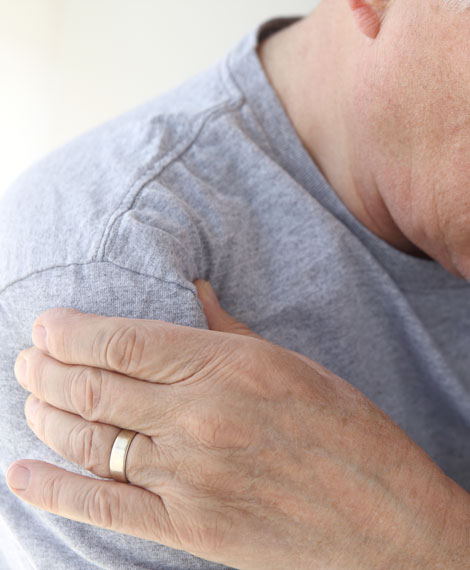Rotator Cuff Tendonitis or Tear

Shoulder pain is an extremely common complaint that has many causes. Because we use our arms for so many common activities, shoulder pain can cause significant problems. In order for proper treatment, the cause of the problem must be identified.
Many people with shoulder pain may be told by a friend or family member that their symptoms sound like a rotator cuff problem. However, there are other causes of shoulder pain, and without an accurate diagnosis the treatment may not properly target the actual problem. Before beginning any treatment plan, be sure you understand the source of your pain.
What is the Rotator Cuff?
The rotator cuff is the group of four tendons and muscles that surround the shoulder joint. Often confused with other names, the proper word used to describe these muscles and tendons is the rotator cuff. When the rotator cuff is injured, it's the tendons of the rotator cuff that are injured. It is these tendons that connect the rotator cuff muscles to the bone. When the tendons are inflamed or torn, they cannot function properly.
The rotator cuff is not only important with lifting movements of the shoulder, but the muscles and tendons are critical to the normal stability and mechanics of the shoulder. Without a properly functioning rotator cuff, you would expect some limits in normal shoulder function.
Symptoms
The most common symptom of a rotator cuff problem is pain. Patients usually complain of pain over the top of the shoulder and arm. In some patients, the pain can descend down the outside of the arm all the way to the elbow.
The other common symptom of a rotator cuff tear is weakness of the shoulder. Weakness causes difficulty lifting the arm up overhead or difficulty with activities such as reaching, getting dressed, or carrying objects.
Rotator cuff tears are incredibly common, especially as we age; so common in fact, that most people with a torn rotator cuff don't even realize they have a problem. Most people with a rotator cuff tear have no pain and minimal limitations in function. However, sometime the tear can cause symptoms, and these individuals may require treatment.
Treatment
Conservative treatments
Treatments such as rest, ice and physical therapy — sometimes are all that's needed to recover from a rotator cuff injury. If your injury is severe and involves a complete tear of the muscle or tendon, you might need surgery.
Injections
If conservative treatments haven't reduced your pain, your doctor might recommend a steroid injection (or a nerve block) into your shoulder joint, especially if the pain is interfering with your sleep, daily activities or exercise. As newer advances in medicine are available, your physician at Restore Medical Partners may recommend a platelet rich plasma injection or even stem cell injection to treat your pain before proceeding with surgery.
Therapy
Physical therapy exercises can help restore flexibility and strength to your shoulder after a rotator cuff injury. Sometimes it is possible to eliminate pain and restore function without surgery. Often times, physical therapy is difficult due to underlying pain. Following an injection, your doctor may have you immediately begin rehabilitative therapy for the shoulder to take advantage of pain relief.
Surgery
Many different types of surgeries are available for rotator cuff injuries, including arthroscopic tendon repair, open tendon repair, bone spur removal, tendon transfer and shoulder replacement. For these surgical options, Restore Medical Partners would refer you to an experienced orthopaedic surgeon.
REFERENCES:



